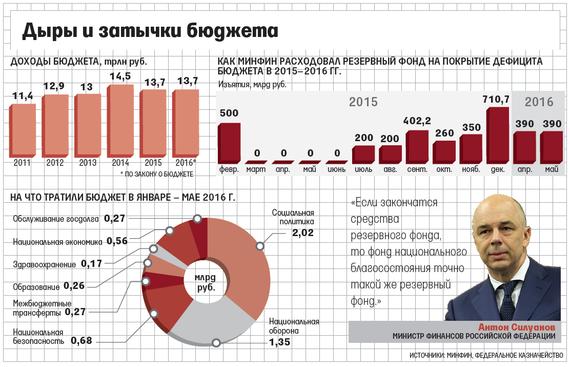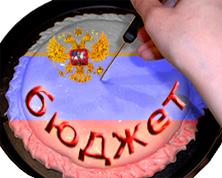In real terms, this decline of 20%

The Russian budget in the next three years will feel the icy breath of the crisis
Sergei Savostyanov / TASS
- Alexander Prokopenko, Olga Kuvshinova, Elizabeth Bazanova
“Vedomosti” familiar with the proposal of the Ministry of Finance on financing of state programs and the main areas of Federal spending in the 2017-2019 biennium. the authenticity of the document confirmed the Federal official and the official representative of the Ministry certified the correctness of the figures.
As follows from the document, the expenditure budget proposed to freeze in nominal terms at the level 15,78 trillion in the year all three years. It is even slightly less than the revised expenditure in 2016: they will be of 16.25 trillion. this Is the main proposal of the Finance Ministry, said the representative: “Is the risk-free level of expenditure that we can afford in the current situation, taking into account all risks.”

Central Bank takes away from banks the money
The regulator raised the rate of compulsory reserves to cope with inflation
In this case – adjusted for inflation – Federal spending in real terms will be reduced over three years by about 20% to 2016, even under the condition of achieving the Central Bank target of 4% inflation in 2017 and beyond. According to the document, many of the costs are reduced even in nominal terms: on state programs of social support, affordable housing, development of health, education and agriculture. All of the 42 state programs (they form about half of the budget expenditures) expenditures in nominal terms reduced for 36.
This is the level of spending that you can afford, a Federal official insists that everything that is beyond the scope proposed by the Ministry of Finance, or causes the need to drain reserves, or potentially accelerates inflation. Prime Minister Dmitry Medvedev demanded that the government, on the one hand, to preserve the reserves and to reduce the budget deficit, on the other – to support key sectors of the economy and to fulfill social obligations. “The development of agriculture money to regret it is impossible,” – said, for example, Medvedev at the Congress of “United Russia” (the Chairman of the party), and the indexation of pensions is to be returned to the rate of inflation from 2017
The maximum reduction of Finance expects the state program on development of physical culture and sport (more than twice in three years), the state program of socio-economic development of the Far East and Baikal region up to 20 times. More than halved funding for socio-economic development of the Crimea: 149,3 billion rubles in 2016 to 65,98 billion in 2019 Closed part of government programs (primarily defense costs) is also reduced by 15% over three years. The nominal growth of expenditures is envisaged for public financial management, economic development, and industrial development.

Medvedev promises balanced budget
All the unpopular decisions will be made after 2018
In the non-programme parts of the budget, nominal costs increase only on the development of the pension system – from 3.35 trillion rubles in 2017 to 3.67 trillion in 2019, or 20% compared with 2016, ie approximately at the level of inflation. The maximum reduction in funding of the Central election Commission expects a spike in costs which will occur in 2017 – 21.4 billion rubles (in 2016 16.5 billion) and then decline to 4.6 times.
The government has already decided to keep the costs of 2017 at the level of 2016, the instruction was given by the Prime Minister after consultation with the Ministers of Finance and economic bloc. According to the Center for strategic research, the fixation of the nominal cost of all three years allows to reduce the budget deficit to 1% of GDP in 2019: reserve Fund for its financing will not be enough next year. The Ministry of Finance also intends to Finance the deficit at the expense of the national welfare Fund (NWF), said Finance Minister Anton Siluanov: “Fund the same reserve Fund.
The budget deficit in 2016 could grow to 520 billion rubles to 2.88 trillion (that of 3.66% of GDP), and the reserve Fund by the end of the year will remain 900 billion rubles, said Deputy Finance Minister Alexei Lavrov (quoted by “Interfax”), the Ministry of Finance also expects the shortfall of revenues of 700 billion rubles compared to the figure stipulated in the budget act (of 13.73 trillion) that will increase on 300 billion rubles of expenditures from the reserve Fund. However, according to Lavrov, the worst stage of adaptation of Russian economy to new conditions has already passed, and so we need to create conditions for achieving sustainable growth by balancing the budget and bringing to the new realities of the budget system.
Freeze nominal budget expenditures by 2017 – a reduction in real spending and deficit by about 0.5 percent of GDP per year, explained the Minister of economic development Alexei Ulyukayev: “Such a step seems reasonable and does not entail large risks.” But the speaker stands at a reasonable budget to stimulate the economy.

Officials did not give the Ministry of economic development data for predictions, the chamber has found
The auditors suggest civil servants to improve skills
The Finance Ministry plans to budget the average annual oil price of $40 per barrel for all three years. As predicts the Ministry of economic development, the economic downturn could be completed in 2016, and by 2019 the GDP growth rate needs to exceed 2%, which implies growth and revenues.
The Finance Ministry wants to increase domestic debt and external borrowing has no plans for sanctions, but still insist on saving reserves and the conservation of the airbag.
Deficit within 1% of GDP, and safe for the economy and for the budget, explained Siluanov. But to reach such a level, we need a deep inventory budget commitments – it will start in 2017, warned the Minister. Not all the spending budget is effective enough, complained Siluanov suggested to give including support for specific industries. “A number of subsidies allocated not on the basis of the impact that subsidies have on economic growth,” he explained. In this part we will need to offer a more fair point and stimulating approach to the allocation of budget funds.
Hard budget constraints – a good incentive to go for reforms to improve the efficiency of budget spending, had interfered with a relaxed state, said Siluanov.
Without government spending there is no growth, says Natalia Orlova of Alfa Bank: if the freezing of expenditure will be accompanied by the preparation of a plan for serious reforms, anything terrible in it is not. But in 2016, Russia will be in recession, and in 2017, the dynamics of GDP will remain around zero. Without reforms and budgetary growth, this trend will continue until 2019, concludes Orlov.









